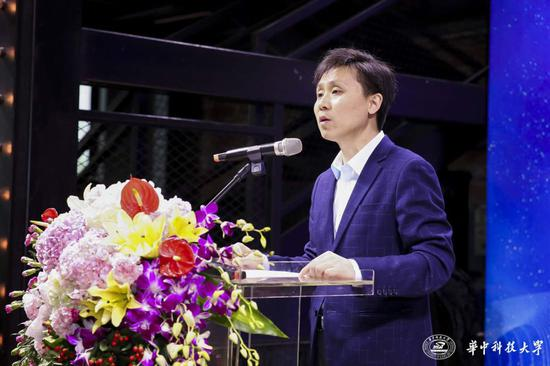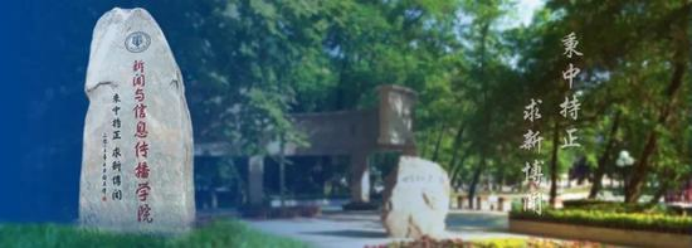Data is now increasingly becoming a new factor of production. How to use data scientifically and rationally, let data empower content and transmit information more accurately and efficiently discover trends, has increasingly become an indispensable skill for talents in various industries. What are the characteristics of high-quality data content? How will artificial intelligence affect the development of data content? What are the characteristics of the School of Journalism and Information Communication of Huazhong University of Science and Technology in terms of talent training?
Sina News and Cover News jointly launched a series of "Interviews with Future Media" (IFM)asking the deans of Chinese and foreign journalism schools. In this episode, we invited Mingxin Zhang, Dean of the School of Journalism and Information Communication in Huazhong University of Science and Technology, to share his views on the development of data content. The following is the interview record:
High-quality data content: authenticity, comprehensiveness, and convenience
IFM: Please use two or three sentences to summarize what the content of the data is?
Mingxin Zhang: My understanding of the content of the data is relatively broad. With the development of technology, many texts, pictures, and videos will gradually be transformed into digital content, providing a good foundation for the production and distribution of media content.

Mingxin Zhang, Dean of School of Journalism and Information Communication, Huazhong University of Science and Technology
IFM: What conditions do you think should be met by high-quality data content?
Mingxin Zhang: First, high-quality data content should have high authenticity and authority; second, the coverage of high-quality data content is relatively wide; third, high-quality data content should be convenient and efficient in the process of production.
Artificial intelligence deeply empowers content production
IFM: You once pointed out that artificial intelligence technology will historically change Chinese media. Would you like to tell us in what ways it performed specifically?
Mingxin Zhang: The influence of technology on the shaping of the media industry is getting deeper and faster. Artificial intelligence technology has made news production faster and more convenient, and has historically changed the face of the news dissemination industry. Artificial intelligence will reshape the links of content collection, content production, content distribution, and effect feedback.
IFM: Data open sharing is of great significance to data content production. How do you evaluate the current status of data openness in our country?
Mingxin Zhang: We have done a good job in data development in the fields of sports, finance and health. Data openness provides good opportunities for news production and social governance. However, problems such as data interoperability and inconsistent formats still exist, so we still need to work hard. As long as the data does not involve national security and personal privacy, it can be opened to the media or institutions within a certain range since data opening can drive a wider range of applications,
IFM: What scientific research achievements have been made by HUST’s "Smart Media and Communication Science" research center?
Mingxin Zhang: The concept of the Smart Media and Communication Science Research Center is to use the knowledge, concepts and methods of artificial intelligence to study the development ideas, trends of the news reforming and communication industry.We take intelligent communication as the growth point of subject direction, talent training, scientific research, and social service. Communication science is mainly embodied in the thinking of data science, which requires us to look at the phenomenon and activities of human communication with a scientific perspective, especially the tendency and trend of dataization.
Multi-disciplinary integration to cultivate students' practical ability.
IFM: What are the teaching attempts of the School of Journalism and Information Communication in Huazhong University of Science and Technology in data journalism and visualization?
Mingxin Zhang: We have set up courses related to information communication technology such as artificial intelligence, user analysis, big data mining, information visualization, data journalism, etc., focusing on cultivating students' data literacy and information literacy.

Journalism and Information Communication College in Huazhong University of Science and Technology
IFM: Huazhong University of Science and Technology is strong at traditional engineering in our country, known as "Chinese MIT (Massachusetts Institute of Technology)". What are the characteristics of HUST in the cultivation of journalism talents?
Mingxin Zhang: The initial policy of our college is "intersection of arts and engineering, expertise in application". The so-called "intersection of arts and engineering" emphasizes that journalism and communication should intersect with information science majors such computer science major. "Expertise in application" mainly emphasizes students’practical ability and hands-on ability.
Now, we have developed this concept into a concept of multidisciplinary integration. While maintaining the autonomy of journalism and communication, we also integrate with other disciplines. In addition to science and engineering, we also integrate with humanities, social sciences, medicine and other disciplines. We will soon set up new directions in the Ph.D. and master's programs. If conditions permit, we will also set up experimental classes with health communication characteristics.
IFM: Among the graduates of HUST, how many students will go to new media for employment?
Mingxin Zhang: The proportion of our students who go to new media for employment is very high, at least relatively high. We have five majors: journalism, radio and television, communication, advertising, and broadcast hosting. Among them, all students majoring in communication have gone to new media for employment. 15%~25% of students in journalism and radio and television work in new media companies, and 10%~15% of students in advertising and broadcasting and host arts majors in new media.
IFM: Would you please give some expectations for future data content producers?
Mingxin Zhang: First of all, colleges and universities must cultivate talents related to data content. Apart from that, our news production should be more creative and more in line with the needs of users.
(Source: Cover News)
Special thanks to the School of Media and International Culture, Zhejiang University, and the Digital Visual Education Public Welfare Fund for their support of this program!


 WeChat
WeChat